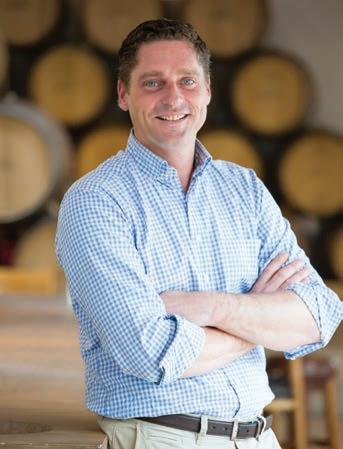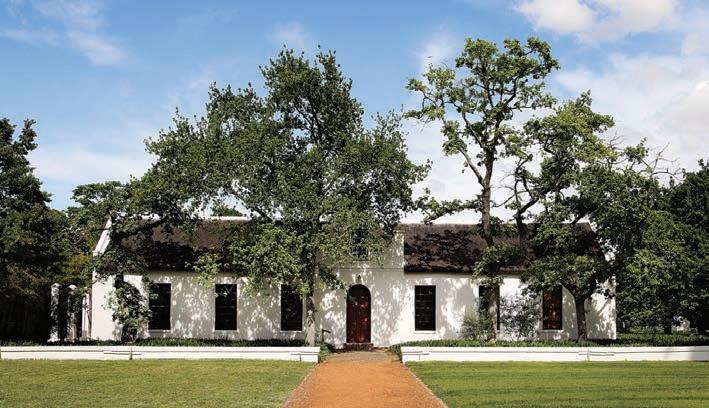
5 minute read
Q&A
Q&A with Joep Schoof, general manager of Spier Hotel & Leisure
Joep Schoof, general manager, Spier Hotel and Leisure, was born in the Netherlands, starting in the hotel trade at a young age, prior to completing his degree at the International Hotel School in Leeuwarden.
Advertisement
As part of this education, he completed his management traineeship at the (then) Dutch owned Lord Charles Hotel in Somerset West, South Africa. Joep’s career in the hospitality industry has seen him specialising in restaurant projects, F&B management, hospitality real estate and hotel management. These roles were completed at a variety of companies, such as the Arabella Sheraton Westin Grand, Pam Golding Hospitality and the Table Bay Hotel, which included pre-opening work for the Sun International group on the Maslow Hotel in Johannesburg.
Joep lives in Cape Town with his wife, Samantha, and two daughters, Natasha and Isabella.
How would you describe Spier?
Spier is an iconic heritage wine farm in Stellenbosch, with a recorded history dating back to 1692. It produces top-quality wine – available both locally and internationally. We offer a range of day visitor activities centred around our historical Werf (farmyard) and wide-open spaces, alongside the 153-bedroom, village style, hotel and conference centre. Spier is also the home to Farmer Angus, who is pioneering regenerative farming and supplies the farm with fresh produce directly from our land.
Where did you begin your career?
From a young age, I started working in this industry at a large family-run hotel, which resulted in me completing my formal education at a hotel school in my home country, the Netherlands. It was through this education that I got to experience South Africa for the first time when I completed my 12-month traineeship in Cape Town. After a stint at a financial institution back home, it was clear that I wanted to return to South Africa and the hospitality industry, which I did in 2003. Before joining Spier, I worked in the hotel, restaurant and hospitality real estate sectors both in Cape Town and Johannesburg.

Joep Schoof
How long have you been in the sector?
I have been in the industry since a young age – starting with pot washing nearly thirty years ago.
What do you enjoy most about it?
Making people happy. In the past, this was quite guest-centric, but it has expanded to include getting satisfaction from creating a happy environment in which team members can excel.
What has been the biggest change you’ve seen in this sector?
If we take the last twelve months out of the equation, the sector showed a strong shift to diversification in its offering, allowing more players to enter the market, which I firmly believe grew the overall size of our industry. Products were created for new niche markets at a rapid pace by focusing on very specific target markets instead of one hotel format for all. In recent years I enjoyed seeing the sector becoming more focused on sustainability, locality and being authentic to its surroundings.
Where do you see the business events industry in South Africa at present?
The present picture is undoubtedly tough: whilst there is some recovery in the leisure space, many companies are understandably still nervous about hosting in-person events. Operators can boost clients’ confidence about hosting meeting and events through sharing and implementing responsible and safe practices – including physical distancing, hygiene protocols and hybrid formats. Together with our partners (including PCOs and corporate clients) we need to showcase how the industry has adapted, incorporating new techniques and being creative in finding new ways for people to connect safely.
What do you think the next few months will hold for the industry?
Whilst it is hard to predict, with so many variables in play, we expect to see a small uptick in activity until autumn. Winter is likely to be calmer, giving us time to prepare for a very active spring and summer. With pent-up demand so clearly evident in the market and a reasonable expectation that there will be greater mobility, the medium-to-longer term outlook for our country and our continent looks strong. Africa remains a once-in-alifetime experience for many visitors and we’re sure that visitors will come once they’re able to.
How did Spier’s Hotel and conferencing adjust their strategies since the start of the pandemic?
Frankly, we have not stopped adjusting, and I expect we will continue adapting for some time to come. Our strategy, in short, is to remain agile, and adapt our offering to every phase we go through. Each phase so far has thrown up different limitations and thus different solutions. We have created a temporary soup kitchen, studio events, exclusive online events, hybrid events and outdoor events (we have plenty of outside space at Spier for these). We’ve also converted some bedrooms into long-term office rentals with private gardens and a free Kids’ Club (where children can be supervised safely while parents work). We will continue expanding and revising our offerings in the weeks and months ahead.
What has been your biggest challenge since lockdown restrictions eased up?
Building up our clients’ confidence that we are well-equipped and prepared to operate most responsibly to ensure their attendees can feel as comfortable as possible. We have organised multiple events, online, then hybrid and more recently on the farm to showcase how serious we take safety precautions whilst presenting creative solutions to make events happen. I would like to think that this approach was a major contributor to us hosting the first international movie production since the lockdown in South Africa late last year, which meant we were home to ninety crew members and cast for over two months in a so-called ‘bio-bubble’.
What do you think is key for businesses to survive during a pandemic?
Managing your cashflow. This was key well before the pandemic, but this last year has really shown that being on top of your cashflow could be the difference between surviving and being out of business. This, coupled with endless doses of lateral thinking so that you can spot opportunities even when there don’t appear to be any.
What advice do you have for smaller businesses trying to survive in the industry over the next few months?
I believe that, irrespective of the business size, it’s important to find partners you want to do business with, people that you respect and who respect you. The solid foundation of your relationship will be all important during tough times because people will continue to give you a piece of their business at a time when it’s really needed.
And finally, what is your secret to success?
I’m not sure if this counts as success, but what gets me up in the morning is the belief that there is always a solution – you just have to keep coming up with ideas until you find it. Also: stop competing with others and start competing with yourself. Having a sense of humour is important. All this combined helps me to deal with the hurdles that life throws at me.











